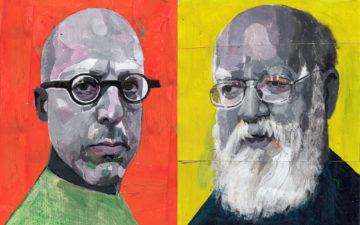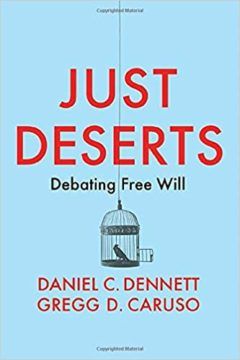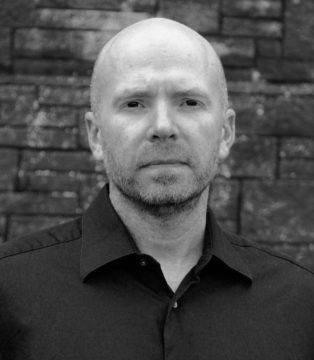by Ed Gibney
 Just Deserts is a surprisingly slim book, only 206 pages long, which could almost be a chapter for one of its authors, let alone a full book from two. It has a whimsical title that hints it might simply be the sweet ending of a multi-course meal cooked up and eaten elsewhere. But don’t be fooled! Just Deserts holds a titanic discussion concerning two huge cracks in the foundations of human thought. The first is the stated crack about the well-known problems of free will, moral responsibility, and social justice. The second crack is an unstated one that only reveals itself in a meta consideration of the styles of the two authors. That shows us there’s a very deep question underneath it all concerning how we should even do philosophy to properly think about these topics.
Just Deserts is a surprisingly slim book, only 206 pages long, which could almost be a chapter for one of its authors, let alone a full book from two. It has a whimsical title that hints it might simply be the sweet ending of a multi-course meal cooked up and eaten elsewhere. But don’t be fooled! Just Deserts holds a titanic discussion concerning two huge cracks in the foundations of human thought. The first is the stated crack about the well-known problems of free will, moral responsibility, and social justice. The second crack is an unstated one that only reveals itself in a meta consideration of the styles of the two authors. That shows us there’s a very deep question underneath it all concerning how we should even do philosophy to properly think about these topics.
 I’ll return to that second crack once we’ve explored the first one. But why do that at all? Does free will matter to anyone but a couple of bickering philosophers? Of course it does! Sam Harris noted in his recent Final Thoughts on Free Will that this topic “touches nearly everything we care about: morality, law, politics, religion, public policy, intimate relationships, and feelings of guilt and personal accomplishment. … In fact, the Supreme Court of the United States has worried about this and called free will a ‘universal and persistent foundation for a system of law’ and has said that determinism is ‘inconsistent with the underlying precepts of our criminal justice system.’ So, this idea of free will seems to be doing a lot of work in the world.”
I’ll return to that second crack once we’ve explored the first one. But why do that at all? Does free will matter to anyone but a couple of bickering philosophers? Of course it does! Sam Harris noted in his recent Final Thoughts on Free Will that this topic “touches nearly everything we care about: morality, law, politics, religion, public policy, intimate relationships, and feelings of guilt and personal accomplishment. … In fact, the Supreme Court of the United States has worried about this and called free will a ‘universal and persistent foundation for a system of law’ and has said that determinism is ‘inconsistent with the underlying precepts of our criminal justice system.’ So, this idea of free will seems to be doing a lot of work in the world.”
Indeed it does! But do we actually have it?
Guiding us through this question are Dan Dennett and Gregg Caruso. Just Deserts grew out of their widely read Aeon article from 2018, which Dan and Gregg have now revised and greatly expanded into 107 individual exchanges grouped into three main parts and a dozen subsections. Lucky us. These are two of the top philosophers in the world on this subject. They speak without jargon wherever possible. They display an incredible command over the academic literature in the field, yet somehow manage not to assume us readers know any of it. They don’t duck or back down from direct questions. They are witty, respectful, and well acquainted with one another’s work. And they write informally and at times emotionally with one another. It produces a literally page-turning experience, like an epistolary novel, where I couldn’t stop myself at times from flipping ahead to see how one or the other would react to what was being said.
Sadly, their mutual understanding gets strained near the end of the book as the two sides struggle to reconcile their positions with one another. What’s the big fight? To sharpen that up, we first need to know the many, many things that Gregg and Dan agree upon. Both are naturalists (JD p.171) who see no supernatural interference in the workings of the world. That leaves both men accepting general determinism in the universe (JD p.33), which simply means all events and behaviours have prior causes. Therefore, the libertarian version of free will is out. Any hope that humans can generate an uncaused action is deemed a “non-starter” by Gregg (JD p.41) and “panicky metaphysics” by Dan (JD p.53). Nonetheless, both agree that “determinism does not prevent you from making choices” (JD p.36), and some of those choices are hotly debated because of “the importance of morality” (JD p.104). Laws are written to define which choices are criminal offenses. But both acknowledge that “criminal behaviour is often the result of social determinants” (JD p.110) and “among human beings, many are extremely unlucky in their initial circumstances, to say nothing of the plights that befall them later in life” (JD p.111). Therefore “our current system of punishment is obscenely cruel and unjust” (JD p.113), and both share “concern for social justice and attention to the well-being of criminals” (JD p.131).
That’s a lot to agree with! They sound like natural allies, right? This is likely why Dan and Gregg have continued to write together. It would be a monumental advance in political and metaphysical philosophy if they could hash out their differences and build a united coalition against the status quo. Gregg and Dan both want to halt the demonization of criminals, and the monstrous forms of retributive justice that exist because of such notions. But both have very different approaches on how to do so.
The central issue at hand is the relationship between free will and moral responsibility. These are inextricably tied to one another. The more you believe in a person’s free will, the more you will hold them morally responsible for their actions. (This relationship has even been demonstrated empirically in recent experiments.) And the amount that you hold a person responsible is related to how much they deserve to be praised or blamed, rewarded or punished, which, of course, affects the entire justice system.
Dan is a compatibilist in this debate. He has long rejected the extreme version of libertarian free will, and instead defends a less radical version he calls the free will worth wanting. Likewise, he rejects extreme versions of moral responsibility, and instead defends a familiar concept of desert that keeps moral responsibility on the table, albeit only for the consequentialist “forward-looking benefits of the whole system” (JD p.45).
Gregg, however, is an incompatibilist about all of this. In addition to rejecting the extreme version of libertarian free will, he uses two further arguments to say we ought to be free will skeptics and discard the notion entirely. Then, on the flip side, Gregg cites a definition for basic-desert moral responsibility that shows that must go too. He concludes that many terms in this debate are too tainted to rescue, so he has built an entire replacement for them in what he calls his Public Health-Quarantine Model. (There is much more on this in his forthcoming book Rejecting Retributivism.)
Now for the big question—who wins? I have my own personal choice, but the publishers of Just Deserts have been gathering opinions from readers in an online survey and the current data basically shows a dead heat. So, there isn’t an answer that undeniably emerges here. But honestly, has any book of philosophy ever done that? Few, if any, readers will finish one and think, “right, that’s sorted.” But by allowing us to witness their debates, Gregg and Dan have given us a book that’s more valuable than if either had just written another one alone. So, the real winner? It’s us, obviously.
As for me, I read through the exchanges rooting for Dan and Gregg to come together to solve this issue for us all. But what became obvious over the course of the book was that the second major crack I mentioned at the top of this essay—the crack that lies at the heart of doing philosophy—seemed to doom Gregg and Dan to remain divided. Gregg is an extremely proficient analytical philosopher. He strives for absolute clarity in his arguments, and quite possibly achieves the Holy Grail of internal consistency for his project. But Dan looks at too many of his neat and tidy definitions and says, hang on, you can’t look at the world that way. Dan repeatedly accuses Gregg of rathering when he says something must be this rather than that. To Dan, that’s often just a false dichotomy; a binary choice in an analog world. This is an evolutionary view of things that is best exemplified by the following quote from Dan’s 2016 essay “Darwin and the Overdue Demise of Essentialism.”
“When Darwin came along with the revolutionary discovery that the sets of living things were not eternal, hard-edged, in-or-out classes but historical populations with fuzzy boundaries…the main reactions of philosophers were to either ignore this hard-to-deny fact or treat it as a challenge: Now how should we impose our cookie-cutter set theory on this vague and meandering portion of reality?”
In other words, Gregg is like a master cookie cutter. He continually presents his tidy definitions, only to have Dan say yes-but-um-well-also-no. I liken this to the reliance of most philosophers on classical logic, which says A is A, not-A is not-A, and the law of the excluded middle says there is nothing else possible in between. Such rigid definitions work well in the precise worlds of mathematics and Newtonian physics, but not in the fuzzy world of biology. In that realm, the ethologist Nikolaas Tinbergen gave us his Four Questions which are now the generally accepted framework of analysis for all biological phenomena. To understand anything there, Tinbergen says you have to understand its function, mechanism, personal history (ontogeny), and evolutionary history (phylogeny). As a very simple example, philosophers could tie themselves in knots trying to define ‘a frog’ such that this or that characteristic is A or not-A, but it’s just so much clearer and more informative to include the stories of tadpole development and the slow historical diversion from salamanders.
So, is free will more like a geometry proof or a frog? I haven’t seen Dan refer to Tinbergen’s questions, but this is basically what he was getting at when he wrote that Freedom Evolves. Gregg explicitly questions this approach when he states, “What baffles me about your position…is that nothing remains fixed and agents can go from having free will at moment t1 to not having free will at t2” (JD p.93). A few pages later, Dan confirms this is accurate but says, “this is a feature not a bug” (JD p.96). By the end of the book, Gregg expresses frustration with Dan’s position saying it “is like wrestling an eel—every time I have a grip on it, or think I do, it slips out of my hands” (JD p.198). To me, these are examples of how it may sound innocent and uncontroversial to admit we all evolved — duh! — but the universal acid of Darwinism “eats through just about every traditional concept, and leaves in its wake a revolutionized world-view” (Darwin’s Dangerous Idea p.63). This is still eating its way through much of philosophy, and to me, this acid eats through some of Gregg’s as well.
I mentioned earlier that Gregg uses two additional arguments to reject the concept of free will entirely. These are the manipulation argument and the luck argument. Debates about these take up over fifty pages of Just Deserts, but here is a very short summary. We are entirely the products of our genes and our environment, but we didn’t choose our genes (constitutive luck) and we are never in control of our environments (present luck). So, according to Gregg, “luck swallows all” (JD p.15). Then, one can use a variety of thought experiments about neurosurgeons manipulating someone’s actions to show us that we wouldn’t blame a person or hold them morally responsible for these manipulated actions, so why should we do so when luck determined all the forces manipulating our actions now?
Dan does a fine job resisting these arguments but adding Tinbergen’s perspective gives us a few additional tricks. It isn’t luck that I grew up to be a person rather than a horse. Once I was conceived, the evolutionary history (phylogeny) that led up to me put a lot of constraints on my personal development (ontogeny). Luck may explain all the differences between me and every other person out there, but we needn’t worry about luck when describing all the things we have in common. There are hordes of characteristics that all humans share, but the one that is most important for this debate is our capacity to learn. The extreme neuroplasticity we have (a mechanism of free will) is what enables all but the most unfortunate humans to sense and respond to their environments (a function for free will) to the point where they slowly, slowly become a unique self.
Furthermore, all of the differences in our environments may be down to luck, but once again there are many elements here that are the same. This is what gives the blind justice system its ability to function across all society—our shared capacity for learning from the elements of culture that we also all share. Wherever we find examples of impairment in learning, or poor exposure to ‘good’ or ‘bad’ culture, we lower the judgments of moral responsibility for that person. This is precisely why children are judged differently than adults. It would result in a sorites paradox to try to precisely define when a child becomes an adult but we can agree to legally draw a bright line for convenience and still roughly understand the fuzziness in Tinbergen analyses that show how an evolved self eventually becomes the location of major influences on our judgeable actions. This is a key part of Dan’s argument about the importance of control to the debate on free will. He isn’t talking about control in a skyhook kind of way that comes from nowhere. He’s just talking about the engineering sense of control as in where the decision-making is located. And for many decisions, the self is this location. It is also where any punishments can work to teach new habits to that self. This, then, is why the manipulation argument fails to persuade. The evil neurosurgeons cannot be taught a lesson by punishing their puppets, so their imaginary examples cannot be extended to the general case of being a human.
To me, these arguments shake the foundations of Gregg’s project, but I admit he’s shaken my beliefs too. What remains clear from that shakeup is the need to reform all retributive attitudes and any awful prison conditions that criminals currently face. That kind of backward-looking basic desert has no justification, and there is no place for it in an enlightened society. It may feel too radical, too certain, to use a lot of classical logic to implement these reforms by throwing out so much terminology and culture that has co-evolved over centuries of civilization, but what we’re left, then, is Dan’s view of free will worth wanting and the familiar concept of desert that most people understand when I say this deserves deep consideration. We may not have free will, but we are a will with an infinite degree of freedom (subject to certain restrictions).
Is that enough? Can we be a puppet who loves his strings (JD p.86)? Do we have to patiently endure the slow evolution of the definitions involved in this debate? Or can an abrupt replacement of concepts give us the clarity we are seeking and the compassionate reforms we want. Can we find a path between moral outrage that is too hot and logical pragmatism that we fear is too cold? The more people who read Just Deserts, and contemplate the cracks between Dan Dennett and Gregg Caruso, the better chance we’ll have of finding out.
***

Ed Gibney writes fiction and philosophy while trying to bring an evolutionary perspective to both of those pursuits. His essays have appeared in such places as peer-reviewed journals, The Humanist, Patheos, and The Philosopher. He has also published several short stories exploring the character virtues of positive psychology, as well as a novel called Draining the Swamp that was sadly titled a few years before Donald Trump adopted that phrase as a campaign slogan. He is currently working to publish a novel about what it would take to live a life without aging. His work can be found at evphil.com. Email: edgibney[at]gmail.com.
